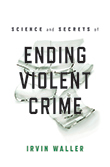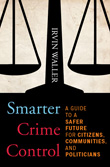Time to end violent crime – gun violence, sexual violence and more. Irvin Waller´s Science and Secrets of Ending Violent Crime is published. What do we now know stops violent crime but is not yet used? What are secrets for action and buyin? What are the secrets for how to make it happen?
Science and Secrets of Ending Violent Crime
Science and Secrets of Ending Violent Crime is the culmination of the lessons learned from Irvin Waller´s decades of using science to advocate across the world for victim rights and ending violent crime. Waller calls attention to the still shocking number of tragedies caused by violent crime, which are so unnecessary given the easily accessible, but little used, solid science of violence prevention accumulated in the last 50 years. Waller shares this science in practical language, providing examples of services for youth and families, for schools, police partnerships and more.
science to advocate across the world for victim rights and ending violent crime. Waller calls attention to the still shocking number of tragedies caused by violent crime, which are so unnecessary given the easily accessible, but little used, solid science of violence prevention accumulated in the last 50 years. Waller shares this science in practical language, providing examples of services for youth and families, for schools, police partnerships and more.
He focuses on internationally agreed but little known conditions that are essential for governments to successfully implement that science. He highlights cities that have started to prevent violence. He shows how to reduce and ultimately stop violence by considering how governments spend our money, manage our cities, and legislate our community safety.
Irvin Waller uses his unique understanding of how to get buy-in so that violent crime will be reduced significantly in the next decade. He draws on the successes and disappointments from the USA and other advanced democracies to show the way to the transformations that will achieve the significant reductions in violent crime that are measurable before 2030 for the Sustainable Development Goals. Investing in effective violence prevention is more affordable and successful than policymakers think; a modest equivalent of 10 percent of what they spend on police, courts, and corrections will do it and often before the next election! Violence prevention is achievable because voters, contrary to what the media tells us, want much more than reaction, they want prevention.
The book will provide the new movements to stop gun violence and violence against women with science based and so proven ways to achieve their goals. Waller brings the truth to the reader, increasing not only their knowledge of the problem at hand, but introducing practical ways to get more involved in making our world free from violence.
Irvin Waller
Irvin Waller is an author and emeritus professor, who is a prize-winning champion of victim’s rights and violence prevention. Governments, Non-governmental organizations and intergovernmental agencies across the world – in the USA, UK, Latin America and elsewhere – seek him as a speaker and adviser. His new book shares what we know and what he has learnt about getting what we know applied to ending violent crime.
Irvin Waller´s life work is using his knowledge across the world of different countries, the science, and logical practice to advance victims´ rights and stop street, intimate partner and sexual violence. His trail blazing work in 1985 to get the UN General Assembly to recognize rights for victims earned him multiple awards, including from the US National Organization for Victim Assistance. This led to more than 30 years working on the problems facing the world´s most crime ridden cities – particularly in advanced democracies – and so his unique ability to use science and success in one country to make advances in another.
REVIEW
“Violent crime harms individuals, families, and communities. It divides social and political discourse and is incredibly expensive to taxpayers. Irvin Waller spent a career studying and advocating for crime prevention and for victims of crime, and in Ending Violent Crime he provides a clear-eyed vision for violence reduction. From smarter use of the criminal justice system to helping youth flourish to effective national and municipal policies, Waller reveals how we can reduce harm by preventing violence in the first place and how we can achieve this goal with rational and affordable investments. Crime scholars, criminal justice practitioners, and policymakers will all benefit from reading this book and acting on its recommendations.”
– William Alex Pridemore, Dean and Distinguished Professor, School of Criminal Justice, University at Albany – SUNY
